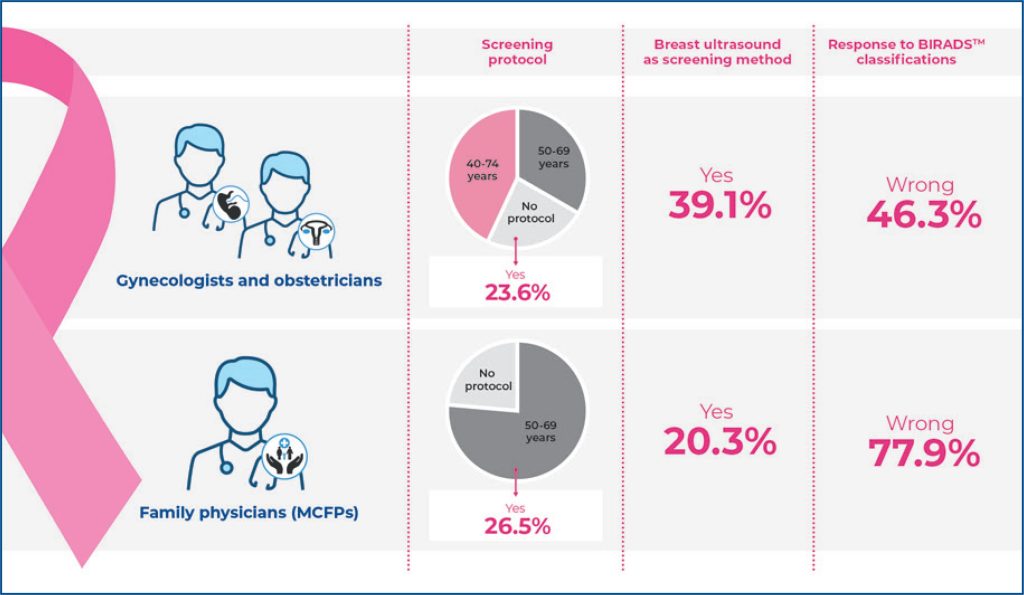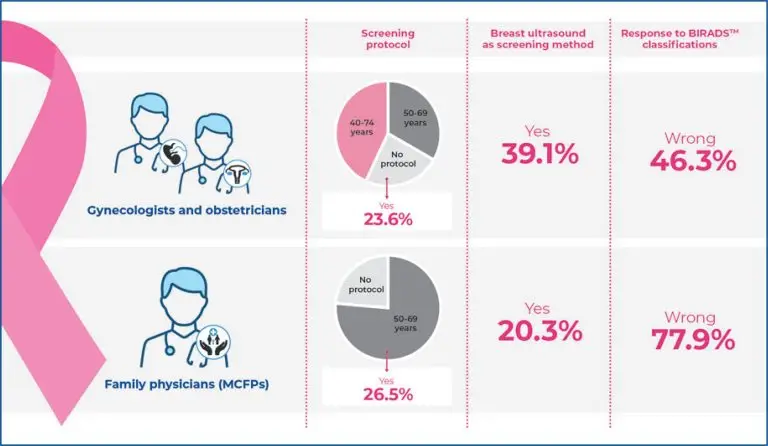einstein (São Paulo). 07/Oct/2024;22:eAO0760.
Knowledge related to breast cancer screening programs by physicians in Brazil
DOI: 10.31744/einstein_journal/2024AO0760
Highlights
Variability in screening protocols: only 42.8% of gynecologists and obstetricians follow the 40-74 years protocol, while 76.6% of family physicians follow the 50-69 years protocol.
High rate of incorrect BIRADS™ interpretation: there were 46.3% incorrect responses among gynecologists and obstetricians and 77.9% among family physicians, highlighting significant knowledge gaps.
Misconception about breast ultrasound: 39.1% of gynecologists and obstetricians and 20.3% of family physicians incorrectly consider ultrasound as a screening method.
Impact of inadequate training: inadequate training leads to improper screening practices that do not align with the BIRADS™ recommended guidelines.
ABSTRACT
Objective:
To evaluate the knowledge and practices of gynecologists, obstetricians, and family and community physicians in Brazil regarding breast cancer screening, mammographic findings defined by the BIRADSTM system, and their approach to suspected clinical lesions.
Methods:
This was an observational, cross-sectional, descriptive study conducted using an online research questionnaire distributed via email to 9,000 gynecologists and obstetricians and 5,600 family and community and preventive medicine doctors actively practicing in Brazil.
Results:
Among gynecologists and obstetricians, 42.8% follow the 40-74 years screening, 33.5% follow the 50-69 years screening, and 23.6% do not follow any specific protocol. Among the family and community physicians, 76.6% follow the 50-69 years screening protocol, and 23.4% do not follow any specific protocol. When we evaluated the responses regarding the behaviors of each BIRADSTM classification, 46.3% of responses were wrong among gynecologists and obstetricians, and 77.9% were wrong among community and preventive medicine doctors, exhibiting a significant difference. The role of breast ultrasound in screening was evaluated; 39.1% of gynecologists and obstetricians and 20.3% of community and preventive medicine doctors consider it as a screening method. Among gynecologists and obstetricians who do not follow any screening protocol, 94.7% consider ultrasound as a screening method. Among community and preventive medicine doctors, only 26.5% of physicians who follow the 50-69 years screening method consider it as a screening method.
Conclusion:
Inadequate training results in gynecologists and obstetricians, and family and community physicians performing inadequate screening and not following the recommended practices outlined in the BIRADSTM system.
[…]
300



